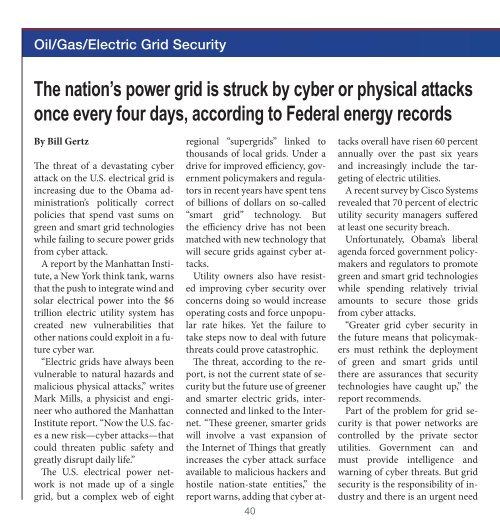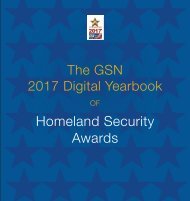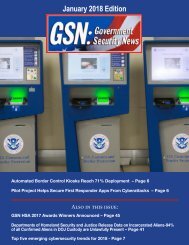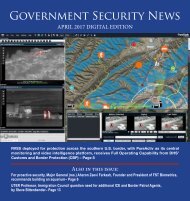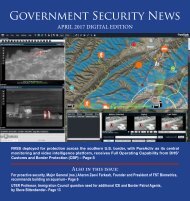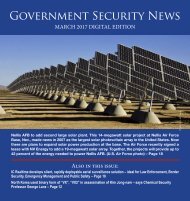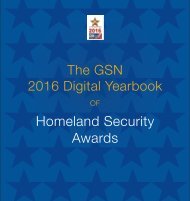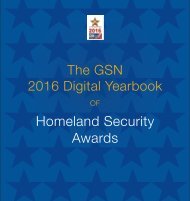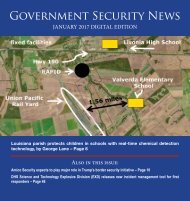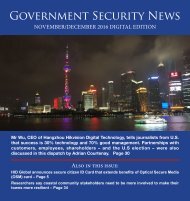GSN_Oct_YUMPU
Create successful ePaper yourself
Turn your PDF publications into a flip-book with our unique Google optimized e-Paper software.
Oil/Gas/Electric Grid Security<br />
The nation’s power grid is struck by cyber or physical attacks<br />
once every four days, according to Federal energy records<br />
By Bill Gertz<br />
The threat of a devastating cyber<br />
attack on the U.S. electrical grid is<br />
increasing due to the Obama administration’s<br />
politically correct<br />
policies that spend vast sums on<br />
green and smart grid technologies<br />
while failing to secure power grids<br />
from cyber attack.<br />
A report by the Manhattan Institute,<br />
a New York think tank, warns<br />
that the push to integrate wind and<br />
solar electrical power into the $6<br />
trillion electric utility system has<br />
created new vulnerabilities that<br />
other nations could exploit in a future<br />
cyber war.<br />
“Electric grids have always been<br />
vulnerable to natural hazards and<br />
malicious physical attacks,” writes<br />
Mark Mills, a physicist and engineer<br />
who authored the Manhattan<br />
Institute report. “Now the U.S. faces<br />
a new risk—cyber attacks—that<br />
could threaten public safety and<br />
greatly disrupt daily life.”<br />
The U.S. electrical power network<br />
is not made up of a single<br />
grid, but a complex web of eight<br />
40<br />
regional “supergrids” linked to<br />
thousands of local grids. Under a<br />
drive for improved efficiency, government<br />
policymakers and regulators<br />
in recent years have spent tens<br />
of billions of dollars on so-called<br />
“smart grid” technology. But<br />
the efficiency drive has not been<br />
matched with new technology that<br />
will secure grids against cyber attacks.<br />
Utility owners also have resisted<br />
improving cyber security over<br />
concerns doing so would increase<br />
operating costs and force unpopular<br />
rate hikes. Yet the failure to<br />
take steps now to deal with future<br />
threats could prove catastrophic.<br />
The threat, according to the report,<br />
is not the current state of security<br />
but the future use of greener<br />
and smarter electric grids, interconnected<br />
and linked to the Internet.<br />
“These greener, smarter grids<br />
will involve a vast expansion of<br />
the Internet of Things that greatly<br />
increases the cyber attack surface<br />
available to malicious hackers and<br />
hostile nation-state entities,” the<br />
report warns, adding that cyber attacks<br />
overall have risen 60 percent<br />
annually over the past six years<br />
and increasingly include the targeting<br />
of electric utilities.<br />
A recent survey by Cisco Systems<br />
revealed that 70 percent of electric<br />
utility security managers suffered<br />
at least one security breach.<br />
Unfortunately, Obama’s liberal<br />
agenda forced government policymakers<br />
and regulators to promote<br />
green and smart grid technologies<br />
while spending relatively trivial<br />
amounts to secure those grids<br />
from cyber attacks.<br />
“Greater grid cyber security in<br />
the future means that policymakers<br />
must rethink the deployment<br />
of green and smart grids until<br />
there are assurances that security<br />
technologies have caught up,” the<br />
report recommends.<br />
Part of the problem for grid security<br />
is that power networks are<br />
controlled by the private sector<br />
utilities. Government can and<br />
must provide intelligence and<br />
warning of cyber threats. But grid<br />
security is the responsibility of industry<br />
and there is an urgent need


